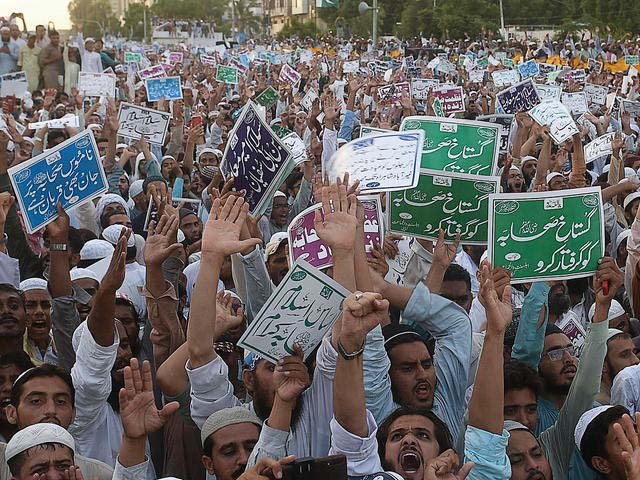
Suppression of religious freedom and targeting of religious and ethnic minorities is old in Pakistan. The country has a long history of sectarianism with anti-Shiism dating back to the late 1970s-1980s. Over the decades, Shias have faced discriminations and there have been attacks by Sunni extremist groups targeting Shias specifically in different parts of the country.
According to data, between 2001 and 2018, approximately 4847 Shias were killed in incidents of sectarian violence.
On Friday September 11, however, hardline Sunni groups organized a massive rally against Shiites in Karachi. Thousands of people participated in the demonstration and chanted anti-Shiite slogans, including “Shia kafir” (Shiites are infidel). The rally was led by supporters of Tehreek-e-Labbaik Pakistan (TLP) and Ahl-e-Sunnat Wal Jamaat (ASWJ). The rally pelted an imambargah with stones as unruly radical Sunni mobs went berserk in the Imamia Lines Area.
At a time when peaceful protests by civil society activists or political parties are not allowed how was it that thousands of supporters of these groups were allowed to march on the streets of Pakistan’s financial hub? It is clear that these outfits had clear backing and support of security agencies and authorities.
This rally comes in the backdrop of rising blasphemy accusations against Shias in recent months. Pakistan has one of the worst blasphemy laws in the world. Historically speaking these laws were used to target Ahmadis and Christians. But in the recent months there has been a rise in anti-Shia blasphemy accusations.
In July, lawmakers in Punjab passed a bill that imposed punishments for vilifying holy Sunni figures. There was a sudden spike in blasphemy cases registered soon after this law was passed. In August alone, four people including two Shias were brutally gunned down for apparent religious reasons. Over the same period, around 50 people mostly Shias were booked under the blasphemy law. According to Senator Akram Baloch “The Punjab government should immediately scrap the law because it is fueling sectarian tensions in the country. The law is being misused.”
Sunni groups, however, assert the law is necessary to protect Islam. According too Hafiz Ihtesham Ahmed, an Islamabad-based Sunni cleric: “The Punjab assembly bill has exposed Shiites who blaspheme against holy figures that are revered by Sunni Muslims. So, I think the cases [against them] are genuine, and the government should arrest all those who have been booked.”
According to the Human Rights Commission of Pakistan (HRCP), “The situation is alarming not only for Shiites but also for the members of other minority groups. The government has turned a blind eye to sectarian organizations that are spreading hatred against Shiites and other religious minorities.”
As chairman of HRCP Mehdi Hasan noted “Seventy-three years on, the historic speech of Jinnah has sunk into oblivion and Pakistan’s religious minorities consigned to the status of second-class citizens, vulnerable to inherent discriminatory practices, forced conversions and faith-based violence.”
![]()





